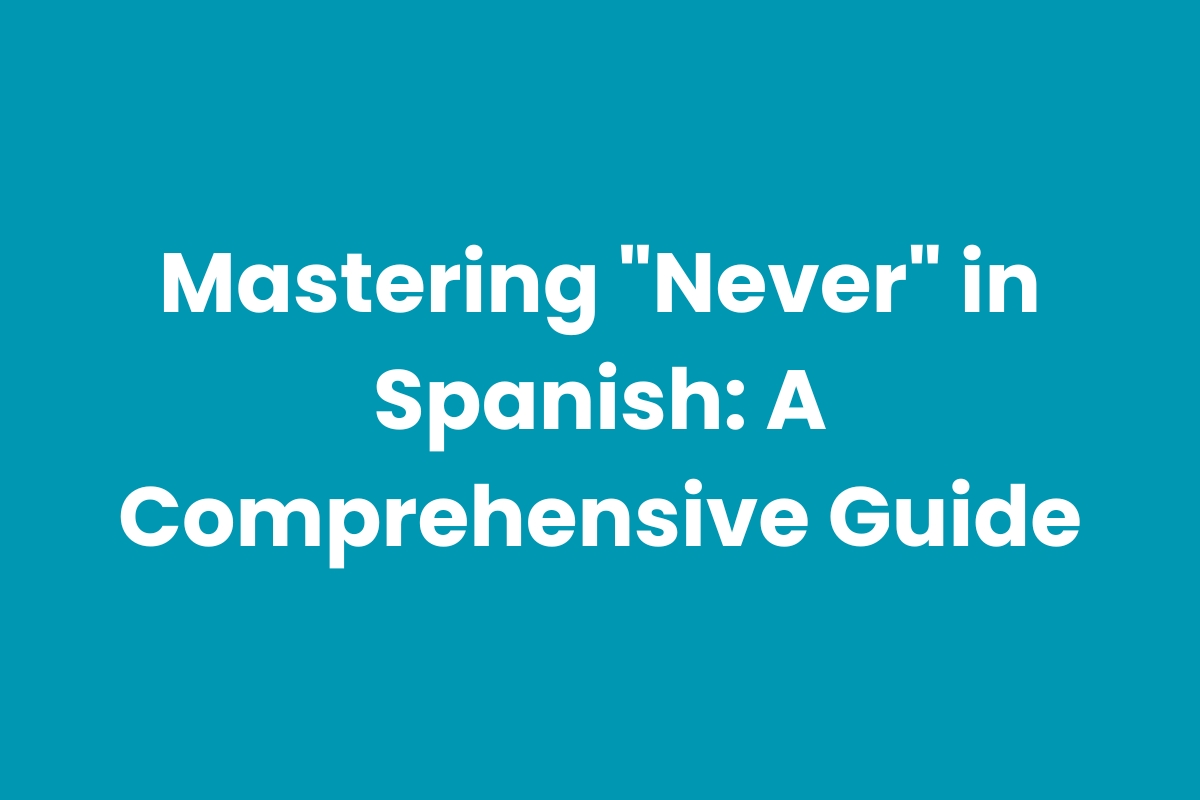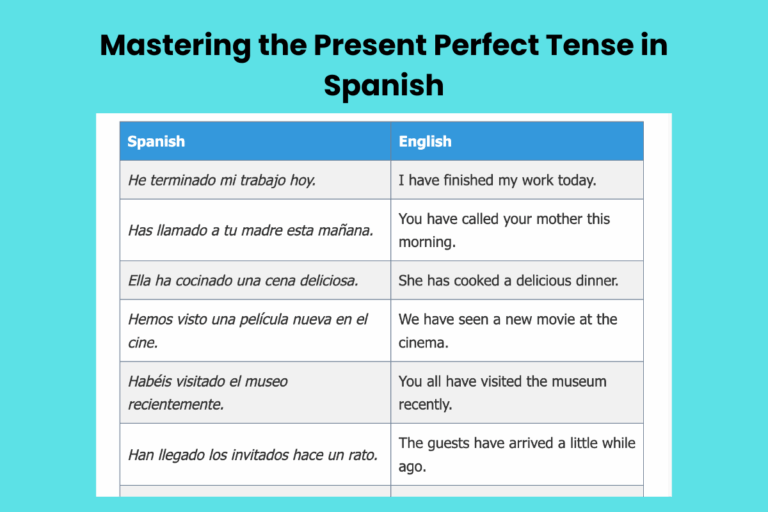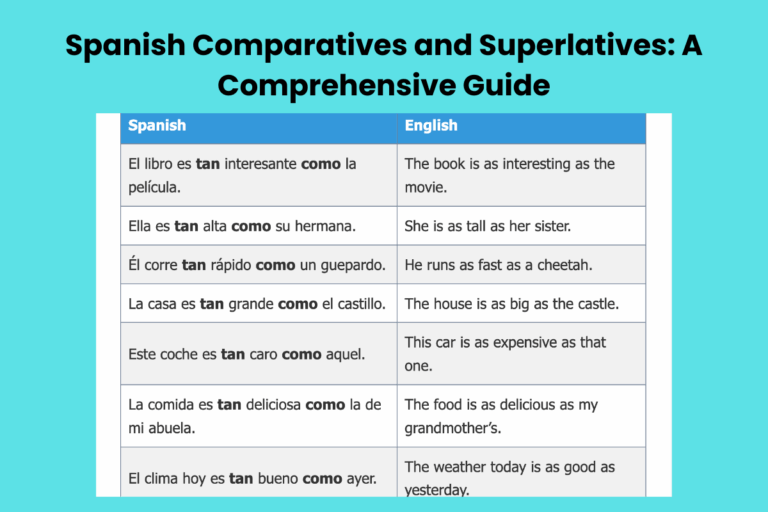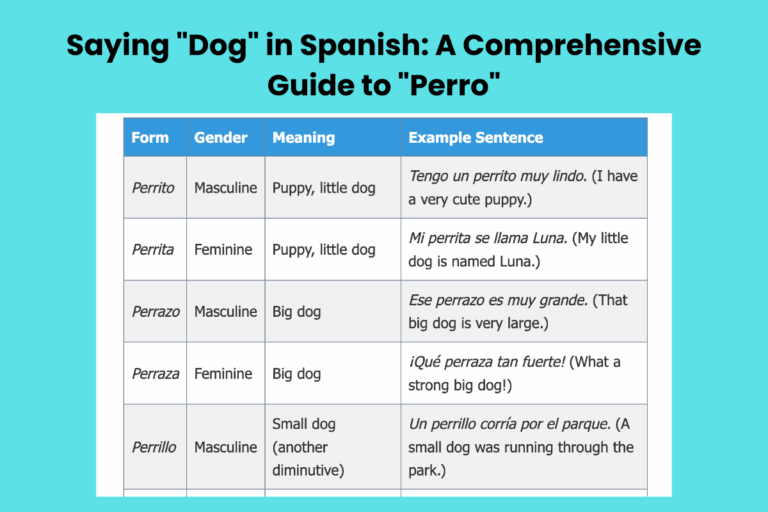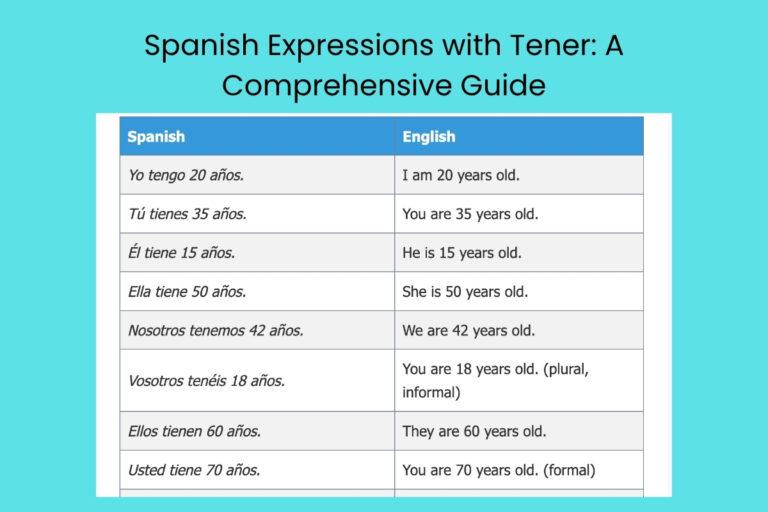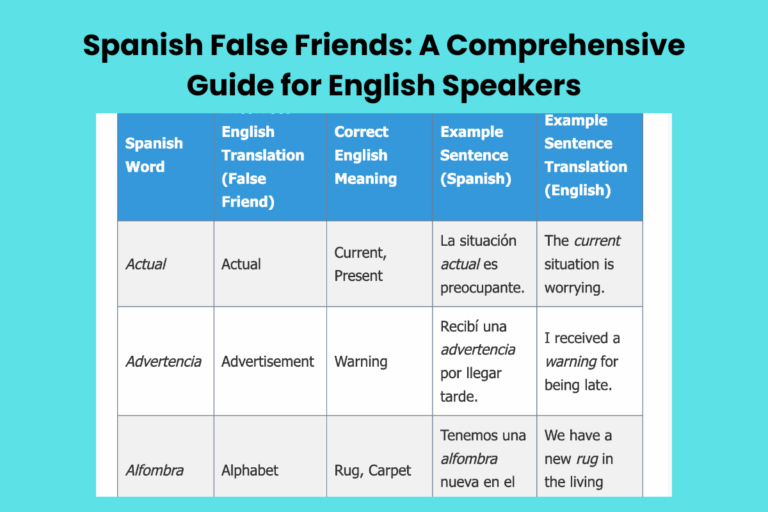Mastering “Never” in Spanish: A Comprehensive Guide
Understanding how to express “never” in Spanish is crucial for conveying negation and expressing experiences, habits, or future intentions. The word “nunca” is the most common translation, but Spanish grammar offers several nuanced ways to express similar concepts.
This guide explores the various methods, providing examples, usage rules, and practice exercises to help you confidently use “never” and its equivalents in Spanish. Whether you are a beginner or an advanced learner, mastering these concepts will significantly improve your fluency and accuracy.
Table of Contents
- Introduction
- Definition of “Nunca” and Its Equivalents
- Structural Breakdown
- Types and Categories of Negation
- Examples
- Usage Rules
- Common Mistakes
- Practice Exercises
- Advanced Topics
- FAQ
- Conclusion
Definition of “Nunca” and Its Equivalents
The primary way to say “never” in Spanish is by using the word nunca. This adverb of time indicates that an action or event has not occurred at any point in the past or will not occur in the future. It’s a fundamental part of expressing negation in Spanish and is widely used in various contexts.
Besides nunca, there are other words and phrases that convey a similar meaning, although with slight nuances. Jamás is another common translation of “never,” often used for emphasis or to express a stronger sense of negation. Ninguna vez literally translates to “not a single time” and is useful when stressing the absence of an event. Finally, the construction No… Alguna vez (Not… ever) is another less common way to convey the same meaning.
Understanding these nuances is crucial for achieving fluency and expressing yourself accurately in Spanish. Each form carries a slightly different emotional weight and is appropriate in different situations.
The following sections will delve into each of these forms in detail.
Structural Breakdown
The structure of sentences using “never” in Spanish is relatively straightforward, but it’s essential to understand the placement of the negative word. In Spanish, negative words like nunca typically precede the verb. However, if a negative word follows the verb, you must also include “no” before the verb to maintain the negation.
For instance, consider the sentence “I have never been to Spain.” In Spanish, this would be “Nunca he estado en España.” Notice that nunca comes before the verb he estado (have been). If we were to restructure the sentence, it would become “No he estado nunca en España,” where no precedes the verb and nunca follows it.
This double negation structure is a key aspect of Spanish grammar and must be correctly applied to avoid miscommunication. Let’s explore this further with examples.
Types and Categories of Negation
Nunca
Nunca is the most direct and common translation of “never.” It is versatile and can be used in a wide range of contexts, from everyday conversations to formal writing. It simply indicates that something has not happened or will not happen.
Example: Nunca he comido sushi. (I have never eaten sushi.)
Jamás
Jamás also translates to “never,” but it carries a stronger emotional weight. It’s often used to emphasize the negation or to express a firm resolve that something will not happen. It can convey a sense of disbelief, shock, or strong aversion.
Example: ¡Jamás te perdonaré! (I will never forgive you!)
Ninguna Vez
Ninguna vez literally means “not a single time.” This phrase is used to emphasize that something has not happened even once. It’s more emphatic than nunca and is often used when highlighting the complete absence of an event.
Example: No he ido a París ninguna vez. (I haven’t been to Paris even once.)
No… Alguna Vez
This construction is less common but still grammatically correct. It involves placing “no” before the verb and “alguna vez” (ever) after the verb.
It conveys the same meaning as “never” but can sound slightly more formal or emphatic.
Example: No he visto esa película alguna vez. (I have never seen that movie.)
Examples
The following tables provide extensive examples of how to use “nunca,” “jamás,” “ninguna vez,” and “no… alguna vez” in various contexts. Each table contains 25 examples to illustrate the different ways these words and phrases can be used.
Nunca Examples
This table provides examples of the most common way to express “never” in Spanish: using nunca. Notice its placement before the verb in most cases, or after the verb when “no” precedes it.
| English | Spanish |
|---|---|
| I have never been to Europe. | Nunca he estado en Europa. |
| She never drinks coffee. | Ella nunca bebe café. |
| They never arrive on time. | Ellos nunca llegan a tiempo. |
| We never watch that show. | Nosotros nunca vemos ese programa. |
| He never forgets his keys. | Él nunca olvida sus llaves. |
| I will never lie to you. | Nunca te mentiré. |
| She never said that. | Ella nunca dijo eso. |
| They never understood the problem. | Ellos nunca entendieron el problema. |
| We never thought about it. | Nosotros nunca pensamos en eso. |
| He never wanted to leave. | Él nunca quiso irse. |
| I have never felt this way before. | Nunca me he sentido así antes. |
| She never complains. | Ella nunca se queja. |
| They never give up. | Ellos nunca se rinden. |
| We never lose hope. | Nosotros nunca perdemos la esperanza. |
| He never stops working. | Él nunca deja de trabajar. |
| I will never forget you. | Nunca te olvidaré. |
| She never asked for help. | Ella nunca pidió ayuda. |
| They never told me the truth. | Ellos nunca me dijeron la verdad. |
| We never doubted him. | Nosotros nunca dudamos de él. |
| He never treated me well. | Él nunca me trató bien. |
| I have never seen such a beautiful sunset. | Nunca he visto una puesta de sol tan hermosa. |
| She never lets me down. | Ella nunca me defrauda. |
| They never listen to my advice. | Ellos nunca escuchan mis consejos. |
| We never had a chance. | Nunca tuvimos una oportunidad. |
| He never learned to swim. | Él nunca aprendió a nadar. |
Jamás Examples
This table showcases examples using jamás, emphasizing the stronger and more emphatic use of “never.”
| English | Spanish |
|---|---|
| I will never forgive him. | Jamás lo perdonaré. |
| She would never do such a thing. | Ella jamás haría tal cosa. |
| They will never understand. | Jamás entenderán. |
| We will never give up. | Jamás nos rendiremos. |
| He will never be the same. | Jamás volverá a ser el mismo. |
| I will never forget this moment. | Jamás olvidaré este momento. |
| She has never seen anything like it. | Ella jamás ha visto algo así. |
| They have never experienced such kindness. | Ellos jamás han experimentado tanta amabilidad. |
| We have never felt so alive. | Jamás nos hemos sentido tan vivos. |
| He had never been so scared. | Jamás había tenido tanto miedo. |
| I will never let you down. | Jamás te defraudaré. |
| She will never betray me. | Ella jamás me traicionará. |
| They will never succeed. | Jamás tendrán éxito. |
| We will never surrender. | Jamás nos rendiremos. |
| He will never change. | Jamás cambiará. |
| I will never speak to him again. | Jamás volveré a hablar con él. |
| She has never been happier. | Ella jamás ha sido más feliz. |
| They have never been so wrong. | Ellos jamás han estado tan equivocados. |
| We have never been so proud. | Jamás nos hemos sentido tan orgullosos. |
| He had never imagined such beauty. | Jamás había imaginado tanta belleza. |
| I will never doubt you again. | Jamás volveré a dudar de ti. |
| She will never forgive herself. | Ella jamás se perdonará. |
| They will never understand our love. | Jamás entenderán nuestro amor. |
| We will never forget their sacrifice. | Jamás olvidaremos su sacrificio. |
| He will never be forgotten. | Jamás será olvidado. |
Ninguna Vez Examples
This table demonstrates the usage of ninguna vez, which emphasizes that something has not happened even “a single time.”
| English | Spanish |
|---|---|
| I have not seen him even once this week. | No lo he visto ninguna vez esta semana. |
| She hasn’t called me even once since she left. | No me ha llamado ninguna vez desde que se fue. |
| They haven’t visited us even once this year. | No nos han visitado ninguna vez este año. |
| We haven’t gone to the beach even once this summer. | No hemos ido a la playa ninguna vez este verano. |
| He hasn’t helped me even once with the chores. | No me ha ayudado ninguna vez con las tareas. |
| I haven’t eaten at that restaurant even once. | No he comido en ese restaurante ninguna vez. |
| She hasn’t read that book even once. | No ha leído ese libro ninguna vez. |
| They haven’t watched that movie even once. | No han visto esa película ninguna vez. |
| We haven’t listened to that song even once. | No hemos escuchado esa canción ninguna vez. |
| He hasn’t traveled to that country even once. | No ha viajado a ese país ninguna vez. |
| I haven’t felt this happy ninguna vez. | No me he sentido tan feliz ninguna vez. |
| She hasn’t cooked this dish ninguna vez. | No ha cocinado este plato ninguna vez. |
| They haven’t played this game ninguna vez. | No han jugado este juego ninguna vez. |
| We haven’t visited that museum ninguna vez. | No hemos visitado ese museo ninguna vez. |
| He hasn’t used this tool ninguna vez. | No ha usado esta herramienta ninguna vez. |
| I haven’t understood the lesson ninguna vez. | No he entendido la lección ninguna vez. |
| She hasn’t answered the phone ninguna vez. | No ha contestado el teléfono ninguna vez. |
| They haven’t finished the project ninguna vez. | No han terminado el proyecto ninguna vez. |
| We haven’t seen the sunrise ninguna vez. | No hemos visto el amanecer ninguna vez. |
| He hasn’t written a letter ninguna vez. | No ha escrito una carta ninguna vez. |
| I haven’t laughed so hard ninguna vez. | No me he reído tanto ninguna vez. |
| She hasn’t cried so much ninguna vez. | No ha llorado tanto ninguna vez. |
| They haven’t complained so often ninguna vez. | No se han quejado tan a menudo ninguna vez. |
| We haven’t celebrated so well ninguna vez. | No hemos celebrado tan bien ninguna vez. |
| He hasn’t slept so soundly ninguna vez. | No ha dormido tan profundamente ninguna vez. |
No… Alguna Vez Examples
This table provides examples of the less common construction No… Alguna vez.
| English | Spanish |
|---|---|
| I have not seen that movie ever. | No he visto esa película alguna vez. |
| She has not traveled to Asia ever. | No ha viajado a Asia alguna vez. |
| They have not tried that food ever. | No han probado esa comida alguna vez. |
| We have not visited that museum ever. | No hemos visitado ese museo alguna vez. |
| He has not read that book ever. | No ha leído ese libro alguna vez. |
| I have not felt so happy ever. | No me he sentido tan feliz alguna vez. |
| She has not cooked that dish ever. | No ha cocinado ese plato alguna vez. |
| They have not played that game ever. | No han jugado ese juego alguna vez. |
| We have not listened to that song ever. | No hemos escuchado esa canción alguna vez. |
| He has not understood the lesson ever. | No ha entendido la lección alguna vez. |
| I have not been so tired ever. | No he estado tan cansado alguna vez. |
| She has not been so angry ever. | No ha estado tan enojada alguna vez. |
| They have not been so excited ever. | No han estado tan emocionados alguna vez. |
| We have not been so disappointed ever. | No hemos estado tan decepcionados alguna vez. |
| He has not been so surprised ever. | No ha estado tan sorprendido alguna vez. |
| I have not laughed so much ever. | No me he reído tanto alguna vez. |
| She has not cried so much ever. | No ha llorado tanto alguna vez. |
| They have not complained so often ever. | No se han quejado tan a menudo alguna vez. |
| We have not celebrated so well ever. | No hemos celebrado tan bien alguna vez. |
| He has not slept so soundly ever. | No ha dormido tan profundamente alguna vez. |
| I have not dreamt of this ever. | No he soñado con esto alguna vez. |
| She has not wished for this ever. | No ha deseado esto alguna vez. |
| They have not hoped for this ever. | No han esperado esto alguna vez. |
| We have not planned this ever. | No hemos planeado esto alguna vez. |
| He has not considered this ever. | No ha considerado esto alguna vez. |
Usage Rules
Placement of Negatives
As mentioned earlier, the placement of negative words in Spanish sentences is crucial. Typically, negative words like nunca and jamás precede the verb. However, if these words follow the verb, you must include “no” before the verb to maintain the negation.
Correct: Nunca voy al cine. (I never go to the cinema.)
Correct: No voy nunca al cine. (I never go to the cinema.)
Incorrect: Voy nunca al cine. (This is grammatically incorrect.)
Double Negatives
While double negatives are generally avoided in English, they are common and grammatically correct in Spanish when used in specific contexts. For example, using “no” before the verb and a negative word after the verb is a form of double negation that is required.
Example: No tengo nada. (I don’t have anything.) Here, “no” and “nada” (nothing) both contribute to the negation.
However, it’s important to note that using multiple negative words in a way that cancels each other out (as in English) is incorrect in Spanish. For instance, saying “No nunca voy al cine” is generally redundant and not considered proper Spanish, although it might be understood in informal speech. Instead, just use “Nunca voy al cine.”
Exceptions to the Rules
There are some exceptions to the general rule of placing negative words before the verb. These usually occur in questions or emphatic statements.
Example (Question): ¿Has estado alguna vez en España? (Have you ever been to Spain?) In this case, “alguna vez” (ever) follows the verb.
Example (Emphatic Statement): ¡No iré, jamás! (I will not go, never!) Here, jamás is used for emphasis at the end of the sentence.
Common Mistakes
One of the most common mistakes is forgetting to include “no” before the verb when a negative word follows it. For example:
Incorrect: Voy nunca al cine.
Correct: No voy nunca al cine.
Another common mistake is using double negatives incorrectly, leading to confusion or unintended meanings. For example:
Incorrect: No nunca voy al cine. (Redundant and generally incorrect)
Correct: Nunca voy al cine.
Another frequent error is misusing nunca and jamás interchangeably without understanding their nuances. While both mean “never,” jamás carries a stronger emphasis.
Incorrect: Using nunca when a strong emphatic negation is more appropriate (e.g., in a vow or promise).
Correct: Jamás te abandonaré. (I will never abandon you – strong emphasis)
Practice Exercises
The following exercises will help you practice using “never” and its equivalents in Spanish. Each exercise focuses on different aspects of negation, from filling in the blanks to translating sentences and correcting errors.
Exercise 1: Fill in the Blanks
Fill in the blanks with the appropriate form of “never” (nunca, jamás, ninguna vez) or the correct word to form a negative sentence.
| Question | Answer |
|---|---|
| Yo ________ he visitado Japón. | nunca |
| Ella ________ haría eso. | jamás |
| Nosotros ________ hemos comido aquí. | nunca |
| Él ________ ha estado tan feliz. | nunca |
| ________ te olvidaré. | Jamás / Nunca |
| No he visto esa película ________. | ninguna vez |
| ________ he tenido un problema así. | Nunca |
| Ella ________ me ha mentido. | nunca |
| Ellos ________ van a la fiesta. | nunca |
| Nosotros ________ hemos bailado tango. | nunca |
Exercise 2: Translation
Translate the following sentences from English to Spanish, using the appropriate form of “never.”
| English | Spanish |
|---|---|
| I have never seen snow. | Nunca he visto la nieve. |
| She will never understand. | Jamás entenderá. |
| We have never been to that city. | Nunca hemos estado en esa ciudad. |
| He has never tried sushi. | Nunca ha probado el sushi. |
| I will never forget you. | Nunca te olvidaré / Jamás te olvidaré. |
| I have not been to Spain even once. | No he estado en España ninguna vez. |
| She never sings. | Ella nunca canta. |
| They never arrive late. | Ellos nunca llegan tarde. |
| We will never surrender. | Jamás nos rendiremos. |
| He does not clean his room ever. | No limpia su habitación alguna vez. |
Exercise 3: Error Correction
Identify and correct the errors in the following sentences.
| Incorrect | Correct |
|---|---|
| Voy nunca al cine. | No voy nunca al cine / Nunca voy al cine. |
| No jamás te abandonaré. | Jamás te abandonaré. |
| He estado no nunca en París. | Nunca he estado en París / No he estado nunca en París. |
| Ella ha no visto esa película. | Ella no ha visto esa película / Ella nunca ha visto esa película. |
| Nunca no voy a la playa. | Nunca voy a la playa. |
| Jamás no te olvidaré. | Jamás te olvidaré. |
| No he comido nunca comida china. | Nunca he comido comida china. / No he comido comida china nunca. |
| No ninguna vez he ido a Italia. | No he ido a Italia ninguna vez. |
| Nunca he no estudiado español. | Nunca he estudiado español. |
| Yo no he nunca visitado Roma. | Yo nunca he visitado Roma. / Yo no he visitado Roma nunca. |
Advanced Topics
Negation with the Subjunctive
In Spanish, the subjunctive mood is often used in clauses that express doubt, uncertainty, or subjectivity. When using “never” in a subjunctive context, it’s crucial to understand how the mood affects the sentence structure.
Example: Dudo que él haya ido nunca a España. (I doubt that he has ever been to Spain.) Here, the subjunctive mood (haya ido) is used because the clause expresses doubt.
Another example: “No creo que jamás lo haga” (I don’t think he will ever do it). The subjunctive “haga” is used because the main clause expresses disbelief.
Idiomatic Expressions
Spanish has several idiomatic expressions that use “never” or its equivalents to convey specific meanings. Learning these expressions can add depth and nuance to your Spanish.
Example: Más vale tarde que nunca. (Better late than never.)
Example: Nunca digas de esta agua no beberé. (Never say never – literally, “Never say I won’t drink from this water.”)
FAQ
- What is the most common way to say “never” in Spanish?
The most common way is to use the word nunca. It’s versatile and widely used in various contexts.
- What is the difference between nunca and jamás?
Both translate to “never,” but jamás carries a stronger emotional weight and is used for emphasis or to express a firm resolve.
- Is it correct to use double negatives in Spanish?
Yes, double negatives are common and grammatically correct in specific contexts, such as when using “no” before the verb and a negative word after it (e.g., No tengo nada). However, avoid using multiple negative words that cancel each other out.
- Where should I place nunca in a sentence?
Typically, nunca precedes the verb. If it follows the verb, you must include “no” before the verb to maintain the negation (e.g., Nunca voy al cine or No voy nunca al cine).
- What does ninguna vez mean?
Ninguna vez literally means “not a single time.” It’s used to emphasize that something has not happened even once.
- When should I use jamás instead of nunca?
Use jamás when you want to emphasize the negation or express a strong emotional response, such as disbelief, shock, or strong aversion.
- How do I use “never” with the subjunctive mood?
When using “never” in a subjunctive context, ensure that the verb is conjugated in the subjunctive mood. For example: Dudo que él haya ido nunca a España.
- What is the meaning of the idiomatic expression Más vale tarde que nunca?
Más vale tarde que nunca means “Better late than never.”
- When is it appropriate to use “No… Alguna vez”?
Although less common, the “No… Alguna vez” construction is still grammatically correct and conveys the same meaning as “never,” often sounding slightly more formal or emphatic.
- Can you give a simple example of the correct way to use “nunca”?
Certainly! Here’s a basic example: “Yo nunca como carne.” This translates to “I never eat meat.” Notice how ‘nunca’ precedes the verb ‘como’.
Conclusion
Mastering the various ways to express “never” in Spanish is essential for effective communication and conveying negation accurately. While nunca is the most common translation, understanding the nuances of jamás, ninguna vez, and the “No… Alguna vez” construction allows you to express yourself with greater precision and emotional depth. Pay close attention to the placement of negative words and the use of double negatives, and practice using these forms in different contexts to solidify your understanding.
By incorporating these concepts into your Spanish learning, you’ll be well-equipped to express a wide range of negative statements and questions with confidence. Remember to review the examples and practice exercises regularly to reinforce your knowledge and improve your fluency.
Keep practicing, and you’ll soon find yourself using “never” and its equivalents naturally and accurately in your Spanish conversations.

